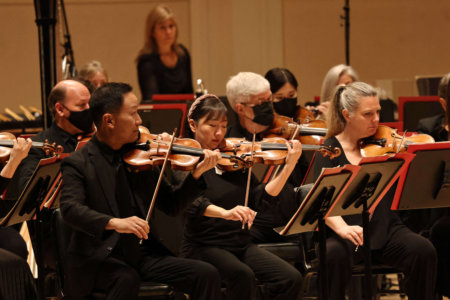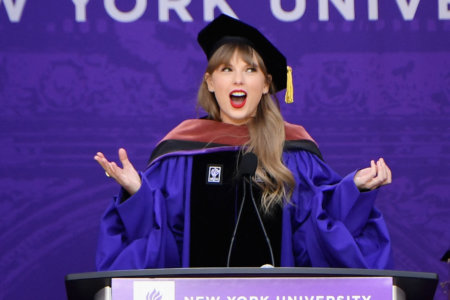
Two artists made Berklee College of Music graduate Jocelyn Wong Li Xian the multi-faceted artist she is today: pop violinist Vanessa Mae and pop-punk band Paramore.
Wong is a singer, songwriter, and music educator from Malaysia who has spent years performing as an independent artist and teaching piano, violin and singing.
When she was four, she went to Mae’s concert with her mother and grandmother. This was when she told her grandmother that she wanted to play the violin.
But it was Paramore that made Wong decide to make music into a career.
“The band really made music make sense for me, and I decided that I’d love to do music for the rest of my life,” says Wong.
A ‘niche’ songwriting course at Berklee College of Music
When she was 13, Wong learned about the Berklee College of Music in Boston, Massachusetts through a friend.
She was drawn to the songwriting programme, then a niche field especially in a country where science, technology, engineering and mathematics degrees are seen as more prestigious.
But Wong knew she wanted to write songs and with Berklee College of Music known as a “mecca to a lot of musicians,” it was a no-brainer for her to apply there.
While Wong was excited to finally be at the home of so many of her favourite artists, she went through “culture shock” in her first few months in Boston.
In Malaysia, Wong’s schools often spoon-fed information and told students to memorise answers for exams. That was not the case at Berklee College of Music .
“The critical thinking and research aspect of my college days really opened up my eyes and drastically changed my approach to everything in life,” she says.
“Be it getting gigs, writing my own music, getting my band together, scheduling rehearsals, running a business — nothing is handed to you unless you go for it.”
Wong relished the challenge and credits it for broadening her views of her home country. It opened her eyes to the power and potential of women musicians.
“It made me appreciate what we have here in Malaysia. I mean — where else can you make a living by just performing and gigging?” she says.
Wong believes other music schools can provide the same experience as Berklee College of Music but she considers her time in Boston — its people, music, and experiences — as “priceless.”
Jiwang – a band of three sisters
When Wong returned to Malaysia, she started a band called “Jiwang” with her younger sisters Jermaine and Jovian. The band was named after and a tribute to their mother, their main supporter and investor in their music education and careers.
Jiwang started out performing covers of “nostalgic songs” in three languages – English, Mandarin and Malay. They would sing Disney tributes, songs from the West, and hits by Wang Leehom, Faizal Tahir and Matt Corby, among others. Later on, they wrote original songs and performed at shows such as Sofar Sounds Singapore in 2018.
For Wong, working with family is the best and the worst — especially when it’s a band comprising three headstrong females.
But at the end of the day, the time spent choosing outfits and makeup, creating music and performing together more than made up for the arguments they have.
What Wong loved most was the unique sound they’ve come up with.
As the oldest sister, she influenced her siblings’ tastes. Fast forward to the present, however, Jermaine and Jovian now each have their own identities, forged from their college years and experiences.

Wong and Mark founded Music Nation, a centre dedicated to educating others about music, music therapy and arts appreciation. Source: Jo Lixian
Music Nation, Malaysia’s first music gym
The idea for a music gym was inspired by Wong’s time working at the Musicians’ Playground in Boston. It’s a music school that doubles as Boston’s #1 community for music lovers, offering private & group music lessons to those interested.
At that time, Musician’s Playground was the first-ever “gym” for music lovers. The concept is similar to an actual gym — instead of working out or training their bodies, people attend Musician’s Playground to train their heart, mind and soul around music in group sessions.
Just like a regular gym, these sessions are a powerful way to get great results, build meaningful relationships with other music lovers, and challenge one’s self in new ways.
Wong adopted a similar structure when she opened Music Nation, a place to conduct music lessons for both children and adults.
“Here at Music Nation, we prioritise group lessons for kids and especially adults, and the guided jam session afterwards – the essence of learning and playing music,” says Wong.
“The cool thing about group lessons is that students are not bound by one instrument! They can try singing today, keys tomorrow or guitar the day after.”
Wong also offers private one-to-one classes that are curated specifically for each individual.
Everyone’s learning style and goals are different, and she endeavours to cater to each and every student under her wing.
“Music Nation has been a dream come true! My business partner Mark, and I are professional musicians, and we want to bridge the gap between music hobbyists and professional musicians by fostering a safe place that is inclusive, creative, practical and fun,” she says. “We believe community is important, especially in the arts, and that music is for all, no matter your background.”
When she’s not teaching or performing in Music Nation, she hosts the Music Nation Speaks Podcast.

Wong is passionate about her music and believes others who want to join the industry should charge forward and just do it. Source: Jo Lixian
Do gender dynamics in the music industry make a difference?
Wong spent most of her time working as a self-employed vocal coach before teaching at USCI University, a private institution in Malaysia.
USCI is ranked 61st in Asia in the QS Asia University Rankings 2024, with its Performing Arts (Music) programme ranking 21st worldwide.
She handled all her performances, working personally with clients and managing gigs independently. At the same time, she was running her music gym, Music Nation.
“It also didn’t help that I was a people pleaser,” Wong says. “I think understanding that it’s one of my weaknesses helped me learn how to delegate and overcome issues in my career.”
It was particularly interesting to see the difference in treatment before and after she got herself a manager – a male one, at that.
“Personally, the biggest difference in treatment that I experienced was when I got myself a manager when handling performances, compared to when I was handling those myself, and people had direct access to me,” explains Wong. “My current manager is a no-nonsense, straightforward kind of guy.”
The music industry is still widely male-dominated, with only 3.4% of music producers being female.
To Wong, the one advice she would give to empower young women to realise their career in this field is: “Just do it.”
“There is no excuse not to pursue and work hard at the thing you love,” she says. “Surround yourself with motivated people, people who lift you up and are willing to work together, and to better each other. In order for others to believe in us, we first have to believe in ourselves.”










